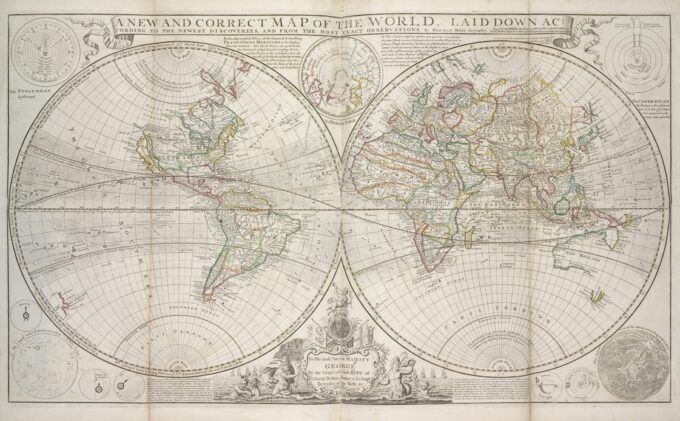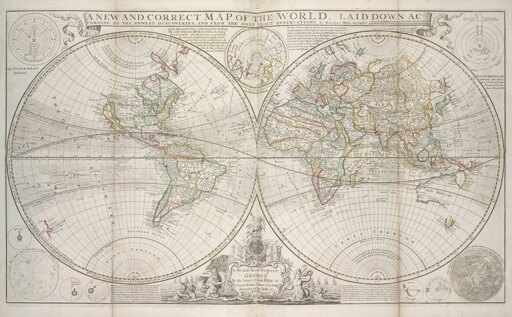
Image by New York Public Library.
It’s no secret America’s reputation is declining. This is thanks largely to Donald Trump, the clown in chief whose weekly blooper reel could make a feature film. Polling shows that just 46% of people from 29 countries view the United States as a force for good. In context, even this seems high — especially given its perpetual warmaking and current aiding and abetting of Israel’s Gaza genocide. Yet it nonetheless lagged behind China’s modest but notable 49%.
But reputation is one thing. Raw power is another — and America still has loads of it. The United States remains the big kid on the block. Everyone else is either too weak or cowardly to challenge them. For a while, statements like that were uncontroversial. America was the lone superpower — its power, beyond debate.
Lately, however, a chorus of voices has assembled to challenge that notion. Commentators, typically of the political Left, are increasingly using the word “multipolarity” to describe a supposedly emerging world order. Professor Carlos Garrido is a particularly sharp leftist exponent of this idea. He defines the theory of multipolarity as follows in an incisive article for Al Mayadeen:
“The unipolar world dominated by the US… came to be in the last decade of the 20th century. But… three decades later, we are seeing it perish wretchedly.”
According to Garrido, American domination is perishing largely at the hands of “anti-imperialist” powers Russia and China. He paints a hopeful picture. The evil empire is falling, and the good guys have come to lead us into a brighter age. But the events of this past week tell a different tale. On November 17th, Donald Trump’s “peace plan” for Gaza came before the United Nations Security Council. With the prospect of the most naked imperialism of this century becoming international law, “anti-imperialists” Russia and China did nothing. Such blatant American criminality going unchallenged like that contradicts the idea we are headed for a multipolar globe. The silence was deafening.
Calling Trump’s plan imperialist is no overstatement. Not only does it offer no timeline for Israeli military withdrawal from Gaza. It would essentially turn the strip into an American protectorate. The plan calls for technocratic “transitional governance.” History cautions that ostensibly temporary governments rarely are; at the very least, they can do irreparable damage in short order. Scarier still is the stipulation that Gaza’s technocracy be subject to the “oversight and supervision” of a “Board of Peace.” At the head of that board is none other than Trump himself, flanked by other Western imperialists like Tony Blair.
So, when the plan reached the Security Council, Russia and China should have been licking their lips. As permanent members, both enjoy veto power. Use it, and history would remember them fondly. This was their time to be heroes. Instead, Russia and China abstained — handing Western hegemony a massive win at the expense of the planet’s most beleaguered people. As veto players, it was quite literally their legal right to resist. Yet they sat on their hands. Such cowardice will not forge the “harmonious world” envisioned and rightfully desired by Hu Jintao and, later, Garrido himself.
That is not to say Russia and China are as bad on the Palestine question as the United States. When the Israelis and Americans sought to gut the United Nations Relief and Works Agency, China announced emergency funding. Beijing has also long called for an independent Palestinian state. The Chinese even helped secure a unity deal between Fatah and Hamas. But China’s defense of Palestine scarcely transcends the realm of supportive rhetoric and soft diplomacy. They are simply unwilling to mount the resistance necessary to abate the onslaught, despite their immense military and economic might. Russia has been even more reserved. But, of course, their inaction pales in comparison to the impetuous complicity of the United States.
Nevertheless, on Palestine, Russia and China are — at best — unreliable friends. This poses a real problem for multipolarity theorists and, more importantly, the future of world peace and security. Despite the rise of “multipolar” powers, and institutions like BRICS+, American imperialism remains very much hegemonic. We should look elsewhere for global leadership in the face of genocide. This is the surest test of our humanity — one Russia and China are failing.
The post The Multipolarity Myth appeared first on CounterPunch.org.
From CounterPunch.org via this RSS feed


